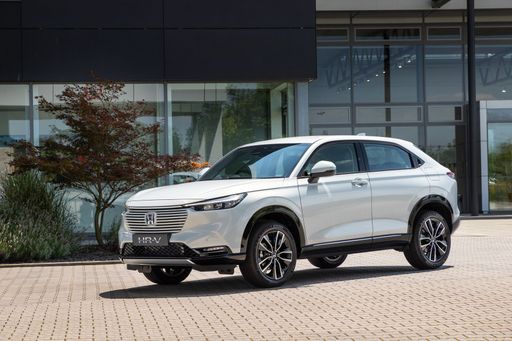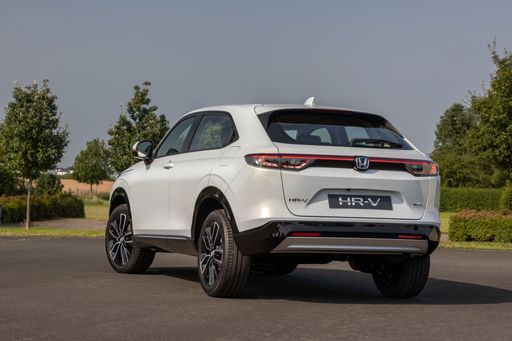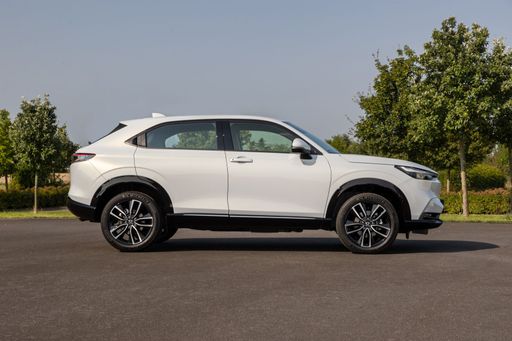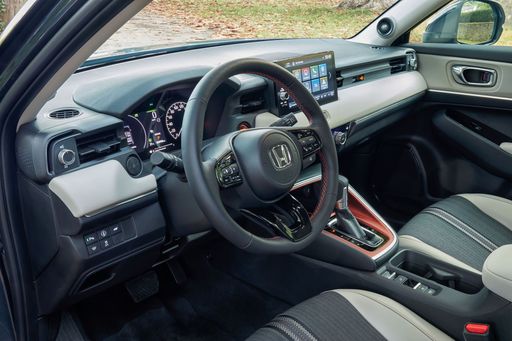Honda HR-V vs Hyundai Bayon – Differences & prices compared
Compare performance, boot space, consumption and price in one view.
Find out now: which car is the better choice for you – Honda HR-V or Hyundai Bayon?
The Honda HR-V (SUV) comes with a Full Hybrid engine and Automatic transmission. In comparison, the Hyundai Bayon (SUV) features a Petrol engine with Manuel or Automatic transmission.
When it comes to boot capacity, the Honda HR-V offers 319 L, while the Hyundai Bayon provides 411 L – depending on how much space you need. If you’re looking for more power, decide whether the 131 HP of the Honda HR-V or the 100 HP of the Hyundai Bayon suits your needs better.
In terms of consumption, the values are 5.40 L per 100 km for the Honda HR-V, and 5.40 L for the Hyundai Bayon.
Price-wise, the Honda HR-V starts at 29700 £, while the Hyundai Bayon is available from 20100 £. Compare all the details and find out which model fits your lifestyle best!
Honda HR-V
The Honda HR-V impresses with its sleek design, combining a dynamic exterior with a comfortable and spacious interior. This versatile compact SUV offers a smooth and responsive driving experience, making it ideal for both city commuting and weekend adventures. Equipped with advanced safety features and technology, the HR-V ensures a connected and secure journey for all passengers.
details @ hondanews.eu
@ hondanews.eu
 @ hondanews.eu
@ hondanews.eu
 @ hondanews.eu
@ hondanews.eu
 @ hondanews.eu
@ hondanews.eu
Hyundai Bayon
The Hyundai Bayon is a compact crossover that effortlessly merges practicality with modern design. Its sleek exterior and spacious interior make it an ideal choice for urban settings and longer journeys alike. With a focus on comfort and connectivity, this vehicle provides a smooth driving experience paired with advanced technology features.
details @ hyundai.news
@ hyundai.news
 @ hyundai.news
@ hyundai.news
 @ hyundai.news
@ hyundai.news
 @ hyundai.news
@ hyundai.news
 @ hyundai.news
@ hyundai.news

|

|
|
|
|
Costs and Consumption |
|
|---|---|
|
Price
29700 - 35400 £
|
Price
20100 - 25800 £
|
|
Consumption L/100km
5.40 L
|
Consumption L/100km
5.4 - 5.5 L
|
|
Consumption kWh/100km
-
|
Consumption kWh/100km
-
|
|
Electric Range
-
|
Electric Range
-
|
|
Battery Capacity
-
|
Battery Capacity
-
|
|
co2
122 g/km
|
co2
124 g/km
|
|
Fuel tank capacity
40 L
|
Fuel tank capacity
40 L
|
Dimensions and Body |
|
|---|---|
|
Body Type
SUV
|
Body Type
SUV
|
|
Seats
5
|
Seats
5
|
|
Doors
5
|
Doors
5
|
|
Curb weight
1452 kg
|
Curb weight
1170 - 1195 kg
|
|
Trunk capacity
319 L
|
Trunk capacity
411 L
|
|
Length
4355 mm
|
Length
4180 mm
|
|
Width
-
|
Width
1775 mm
|
|
Height
1582 mm
|
Height
1500 mm
|
|
Payload
418 kg
|
Payload
460 - 465 kg
|
Engine and Performance |
|
|---|---|
|
Engine Type
Full Hybrid
|
Engine Type
Petrol
|
|
Transmission
Automatic
|
Transmission
Manuel, Automatic
|
|
Transmission Detail
-
|
Transmission Detail
Manual Gearbox, Dual-Clutch Automatic
|
|
Drive Type
Front-Wheel Drive
|
Drive Type
Front-Wheel Drive
|
|
Power HP
131 HP
|
Power HP
100 HP
|
|
Acceleration 0-100km/h
10.6 - 10.8 s
|
Acceleration 0-100km/h
11.3 - 12.4 s
|
|
Max Speed
170 km/h
|
Max Speed
176 - 179 km/h
|
|
Torque
253 Nm
|
Torque
172 - 200 Nm
|
|
Number of Cylinders
4
|
Number of Cylinders
3
|
|
Power kW
96 kW
|
Power kW
74 kW
|
|
Engine capacity
1498 cm3
|
Engine capacity
998 cm3
|
General |
|
|---|---|
|
Model Year
2025
|
Model Year
2024
|
|
CO2 Efficiency Class
D
|
CO2 Efficiency Class
D
|
|
Brand
Honda
|
Brand
Hyundai
|
Honda HR-V
Exploring the Honda HR-V: A Testament to Innovation
The Honda HR-V epitomises the harmonious blend of SUV practicality and hybrid innovation. This remarkable model offers a compelling choice for those seeking a vehicle that is as environmentally conscious as it is versatile. Let's delve into the technical prowess and innovative features that make the HR-V a standout in its class.
Powerful Yet Efficient Hybrid Technology
At the heart of the Honda HR-V is its 1.5 i-MMD e:HEV full-hybrid powertrain. This advanced system delivers a robust 130 PS (96 kW) while maintaining an impressive fuel consumption of just 5.4 L/100km. The HR-V achieves this through its continuously variable transmission (CVT), which optimises efficiency by adjusting seamlessly to driving conditions. The combination results in a smooth yet responsive drive, marking a significant achievement in hybrid technology.
Design and Practicality
The HR-V seamlessly blends elegant design with practical functionality. Measuring 4340 mm in length and 1582 mm in height, it provides ample cabin space while maintaining a compact footprint. Inside, the HR-V comfortably seats five passengers, ensuring a pleasant journey for both driver and passengers. The boot space, ranging from 320 to 335 litres, offers flexibility for various cargo needs.
Performance and Responsive Handling
With a maximum torque of 253 Nm, the HR-V delivers remarkable performance. Its front-wheel-drive system paired with a CVT offers a refined driving experience. The model is capable of accelerating from 0 to 100 km/h in a respectable 10.6 to 10.7 seconds, and can reach a maximum speed of 170 km/h. Despite its performance capabilities, the HR-V remains an eco-conscious choice with CO2 emissions of 122 g/km.
Comfort and Sophisticated Interiors
The Honda HR-V is available in three distinct trims - Advance e-CVT, Advance Style e-CVT, and Elegance e-CVT, each offering a host of features to enhance comfort and convenience. From the quality of materials to the thoughtful layout of controls, every aspect of the HR-V’s interior is designed to offer a superior driving experience. Furthermore, its fuel tank capacity of 40 litres ensures you'll spend more time on the road and less at the pump.
Cost Efficiency and Environmental Consideration
Beyond its technical specifications, the Honda HR-V promises efficient running costs. The estimated monthly cost ranges from €1002 to €1064, with the cost per kilometre ranging between 40.1 to 42.6 cents. This makes it not only an environmentally friendly choice but an economically sensible one as well, especially for those cognisant of their carbon footprint. It carries a CO2 efficiency class of D, affirming its commitment to reduced emissions.
Final Thoughts
The Honda HR-V stands as a testament to how modern SUVs can be both innovative and practical. Its combination of hybrid technology, responsive power, and thoughtful functionality make it a compelling choice for those in search of sustainability without compromising on performance or comfort. As Honda continues to push the boundaries of what's possible, the HR-V ensures you are at the forefront of automotive innovation.
Hyundai Bayon
Introducing the Hyundai Bayon: A New Era in Compact SUVs
The Hyundai Bayon, a compact SUV designed with urban adventurers in mind, is making waves with its exceptional blend of style, performance, and technology. The brand has pulled out all the stops to ensure that the Bayon stands out in the crowded SUV market, offering a vehicle that is both practical and innovative.
Sleek Design and Cutting-Edge Aerodynamics
The Bayon features a striking exterior design, characterised by its bold lines and angular shapes. With a length of 4180 mm, a width of 1775 mm, and a height of 1500 mm, the Bayon commands attention with its modern appeal and aerodynamic efficiency. These dimensions not only contribute to its sleek design but also enhance fuel efficiency, achieving an impressive 5.4 L/100 km.
Engine Performance and Specifications
Under the bonnet, the Bayon is powered by a 1.0-litre T-GDI petrol engine, delivering a robust 100 PS or 74 kW. This engine is available with either a manual or automatic gearbox, meeting varied driver preferences. The front-wheel-drive system complements its urban-centric design, ensuring a smooth and responsive ride.
Maximised Interior Space and Comfort
The spacious interior of the Bayon accommodates up to five passengers comfortably. The vehicle boasts a boot space of 411 litres, perfect for both everyday use and weekend getaways. The cabin is designed with practicality and technology in mind, with intuitive controls and ample storage options.
Advanced Technology and Connectivity
Hyundai has equipped the Bayon with state-of-the-art technology to enhance the driving experience. The SUV features a high-resolution touchscreen, offering seamless connectivity with Apple CarPlay and Android Auto. Safety is also a priority, with multiple driver assistance systems including lane-keeping assist and forward collision avoidance assist.
Environmental Efficiency
Despite its powerful performance, the Bayon achieves a respectable CO2 efficiency class of D, with emissions as low as 122 g/km. This balance between performance and environmental responsibility makes the Bayon an attractive option for conscientious drivers.
Affordability and Market Appeal
The Hyundai Bayon is competitively priced, ranging from €22,900 to €29,600. Its affordable running costs, estimated at 32.3 to 36.4 cents per kilometre, further enhance its appeal to budget-conscious consumers. With monthly costs ranging from €806 to €909, the Bayon provides excellent value without compromising on features or performance.
Final Thoughts
The Hyundai Bayon truly stands out in the compact SUV segment, combining style, innovation, and practicality in an appealing package. It offers a versatile driving experience suited to the demands of modern urban living, making it a top contender in its class. As Hyundai continues to champion forward-thinking design and technology, the Bayon is a testament to the company's ongoing commitment to excellence.
Which drive types are available for the Honda HR-V?
Available as Front-Wheel Drive.
The prices and data displayed are estimates based on German list prices and may vary by country. This information is not legally binding.
